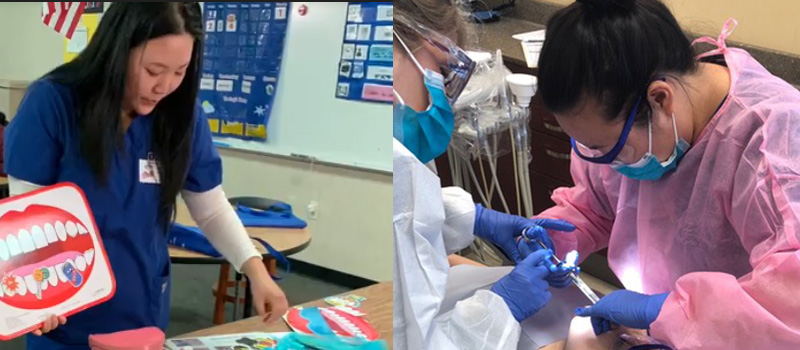
(Photos courtesy of Cindy Kim)
California Forward is committed to advancing policy intersections that create a more inclusive and sustainable California where all people can prosper. To move this forward, we must address the racial and geographic inequities that have been exacerbated by a public health and economic crisis, and we must answer the call to dismantle structural racism. The Voices of Shared Prosperity series amplifies the stories of Californians who are committing their time and talent to solutions that embrace equity, the environment, and the economy.
California has made great progress in providing healthcare for its people. The number of uninsured Californians dropped by 3.7 million since the implementation of the Affordable Care Act, the biggest decline of any state.
Yet, the oral health needs of underserved and underrepresented populations are significantly unmet compared to the general population.
Cindy Kim decided to be a part of the solution. After earning her B.A. in public policy from the University of California, Riverside, she decided to enroll in a vocational school to develop a specialized skill. She enrolled at Concorde Career College to earn her dental hygienist license. Kim has always been passionate about equalizing opportunities and supporting disenfranchised communities but it was her public service fellowship offered by Western Riverside Council of Governments that confirmed her decision to pursue her current path.
The fellowship program placed her with the Morongo Tribal Temporary Assistance for Needy Families (TANF) program. There she worked with families to connect them to support services. “I really got to see what people were going through and the gaps in service and treatment,” said Kim.
Kim expressed that she always had an interest in the dental field but it was her experience providing support services that motivated her to take a more hands-on approach.
Many Californians lack an understanding of oral health and its connection to our general health. It’s the site where symptoms initially manifest and is important in early detection of oral and general health illnesses. Along with early detection, research suggests that oral health care can reduce the risk of systemic disease such as diabetes, cardiovascular disease, and rheumatoid arthritis. Simply put, bad teeth can cause bad health.
Kim’s passion for dental care can be traced back to her childhood experiences. She grew up helping her immigrant parents navigate the healthcare system. Translating documents and explaining procedures gave Kim a sense of agency and urgency to help alleviate these concerns for others.
Like many, Kim’s family struggled to access proper healthcare and community health education. She also witnessed the impact poor health education and health access can have on a community. During her internship, Kim processed claims for children with cavities on their baby teeth and recalled “it was heartbreaking because all of these cases were preventable.”
| California Dream Index Fact: More than one in three California households — more than 3.8 million families — do not earn sufficient income to meet basic needs like dental care. |
|---|
| *Launching at the 2020 California Economic Summit, the California Dream Index is a tool that measures and tracks economic mobility. |
To redress these preventable repercussions, Kim outlined specific recommendations to create access to oral health care for all:
Community Health Education – “I was one of the people who didn’t know,” Kim shared as she discussed oral health practices such as flossing, brushing your teeth routinely and getting oral cancer screenings. Educating the community on oral health practices is the first step to equitable access. Many families prioritize other immediate needs before dental hygiene without understanding its connection to overall health.
Alignment of care with recommendations of authorizing health bodies – The American Dental Association (ADA) recommends two teeth cleanings every 12 months. Kim expressed aligning the coverage of care with these recommendations. Clinics offer more affordable services at community colleges, which helps mitigate the discrepancy with insurances because the price of service is more affordable. This would also expand access and streamline the preauthorization process.
Advocacy for underserved populations – Many dental hygienists speak at elementary schools and community events to raise awareness, but less focus is placed on prison inmates, seniors and special needs children. Kim highlighted the importance of providing these populations with the same education and accessibility that is provided to others and ensures equitable practices.
Break the stigma – The stigma attached to dental procedures is detrimental to oral care. It’s hard to talk about oral care in general conversation. Sometimes people think it's offensive but social awareness is the first step in breaking the stigma surrounding bad breath, tooth decay, or the viewpoint that oral care is secondary to general health. Breaking down the barriers that challenge these conversations is an important next step.
Kim received her certification from the Dental Hygiene Board of California and she was recently offered a full-time position in her field. She will continue her work in providing quality care and community education for all Californians.
The Voices of Shared Prosperity stories will be shared in advance of the 2020 California Economic Summit, taking place on December 3-4.

